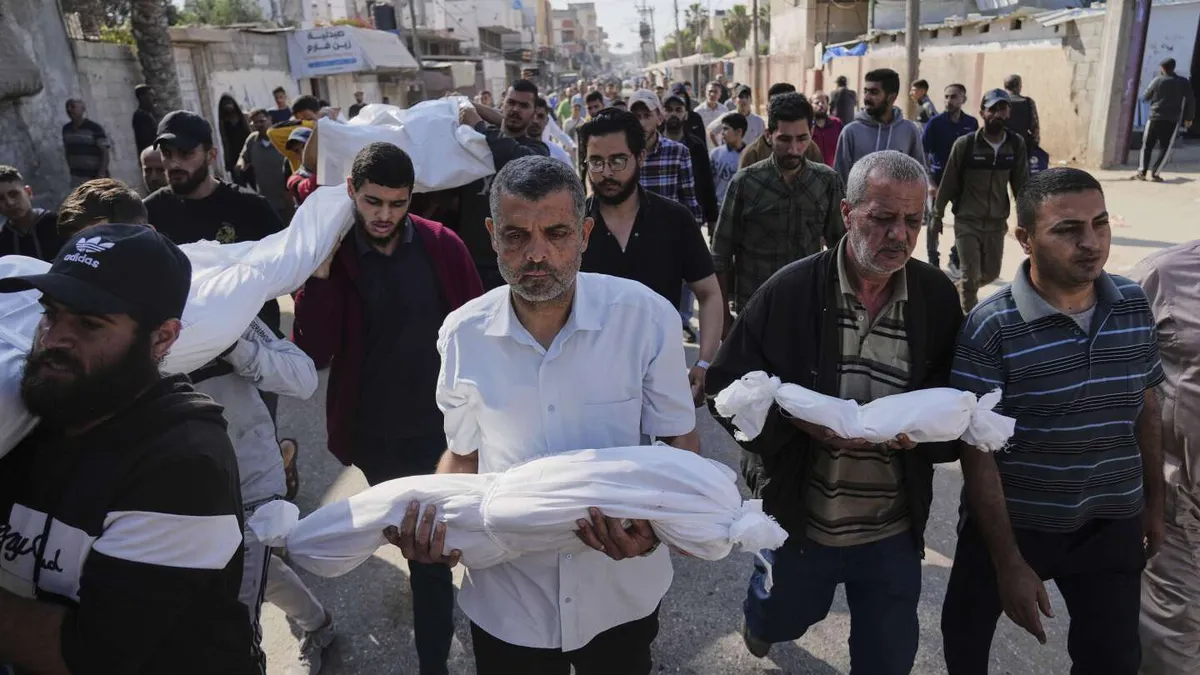
In Deir al-Balah, Gaza, Israeli strikes relentlessly targeted the region on Wednesday, intensifying a military offensive that has drawn widespread condemnation from the international community. According to the Gaza Health Ministry and local hospitals, the ongoing attacks have resulted in the tragic deaths of at least 82 individuals, including several women and a week-old infant. The deteriorating humanitarian situation in Gaza has prompted urgent calls for aid and intervention.
While Israel began permitting a limited number of humanitarian trucks to enter Gaza on Tuesday, the aid has yet to reach the many Palestinians who are in dire need. Jens Laerke, a spokesperson for the United Nations’ humanitarian agency, reported that no trucks were dispatched from the Gaza side of the Kerem Shalom border crossing. U.N. spokesperson Stéphane Dujarric stated that although some aid reached Gaza, operational challenges prevented aid workers from delivering supplies to distribution points. The Israeli military reportedly forced workers to reload supplies onto different trucks, which consumed precious time.
The Israeli defense body responsible for humanitarian aid announced that trucks successfully entered Gaza on Wednesday morning; however, it remains unclear whether this aid would be distributed deeper into the region. The United Nations Relief and Works Agency for Palestine Refugees (UNRWA) mentioned that its staff had waited several hours to collect aid from the border crossing but were ultimately unsuccessful on Tuesday. In a related protest, a small group of Israeli activists attempted to block trucks carrying supplies on Wednesday, but were restrained by Israeli police.
In another troubling development, a group of diplomats was caught in gunfire while visiting Jenin, a city located in the Israeli-occupied West Bank. This delegation, consisting of around 20 regional, European, and Western diplomats, was on an official mission to assess the humanitarian conditions in Jenin when shots rang out. An anonymous aid worker reported that they were near the entrance of the Jenin refugee camp when they heard the gunfire, although fortunately, no one was injured.
According to the Israeli military, the delegation had strayed from their approved route, prompting soldiers to fire warning shots to disperse them from the area. The military later issued an apology and promised to communicate with the countries involved in the visit. European Union foreign policy chief Kaja Kallas condemned the incident, stating that even warning shots were unacceptable, and called for an investigation by Israeli authorities. The Italian government, led by Premier Giorgia Meloni, also demanded an explanation, as its vice consul was present during the gunfire.
The escalating violence has spurred international leaders to take action. On Tuesday, the United Kingdom suspended free trade talks with Israel in response to its ongoing military offensive. This decision followed a joint commitment from the U.K., Canada, and France to take concrete steps aimed at prompting Israel to cease hostilities. Additionally, the European Union is reviewing its trade agreement with Israel in light of the country’s actions during the conflict in Gaza.
Israeli officials have stated their readiness to halt military operations once all hostages taken by Hamas are returned, and Hamas is either defeated, exiled, or disarmed. Conversely, Hamas has expressed its willingness to release hostages in exchange for a complete Israeli withdrawal from the territory and a cessation of hostilities, rejecting demands for exile and disarmament.
As negotiations falter, Israeli airstrikes persist across Gaza. In the southern city of Khan Younis, where new evacuations have been ordered amid an anticipated expanded offensive, 24 individuals were killed, including 14 members of the same family. The Israeli military has yet to comment on these strikes, though it has maintained that its operations target Hamas infrastructure while accusing militants of operating from civilian areas.
Many residents of Gaza, which is home to approximately 2 million people, face a severe risk of famine. At a displacement camp in Gaza City, a charity group distributed thin lentil soup, which left families struggling to survive. One resident, Somaia Abu Amsha, lamented the lack of basic food items, stating, “We have not had bread for over 10 days; we can’t afford rice or pasta.” She expressed a profound yearning for peace over temporary food assistance.
During his first general audience at St. Peter’s Square, Pope Leo XIV called for urgent humanitarian aid to reach Gaza and condemned the “heartbreaking” toll on its people. Meanwhile, Palestinian President Mahmoud Abbas urged world leaders to take immediate action to end Israel's siege on Gaza. Speaking in Beirut, Abbas declared, “It is time to end the war of extermination against the Palestinian people,” demanding the immediate entry of aid, the release of detainees, and a full withdrawal from the territory.
The conflict in Gaza erupted following a deadly attack by Hamas-led militants on southern Israel, which resulted in the deaths of approximately 1,200 individuals, primarily civilians, and the abduction of 251 others. Currently, around 58 captives remain in Hamas's custody, with many believed to be alive after previous ceasefire agreements facilitated the return of others. The ongoing Israeli retaliation has devastated large areas of Gaza, resulting in over 53,000 Palestinian deaths, predominantly among women and children, according to reports from the Gaza Health Ministry.